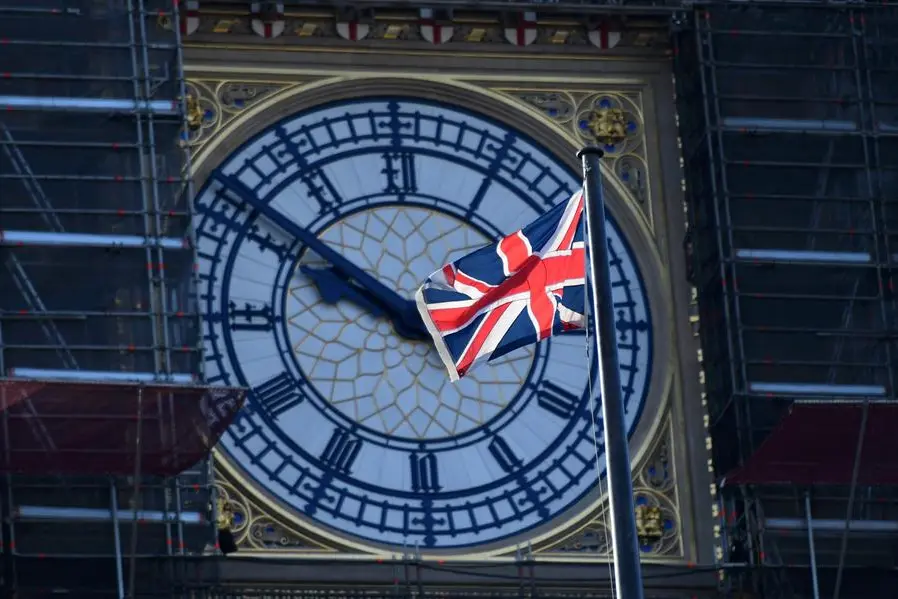PHOTO
The UK government on Thursday unveiled a new definition of extremism which will determine which organisations get public funds and meetings with officials, prompting criticism from various civic, political and religious groups.
The change comes weeks after Prime Minister Rishi Sunak warned of a "shocking increase in extremist disruption and criminality" that risked the country tipping into "mob rule".
Sunak's comments -- made in a Downing Street address to the nation -- follow months of controversial pro-Palestinian protests in British cities but were criticised by some as exaggerated and politically motivated.
The marches protesting Israel's military response to Hamas's October 7 attacks have attracted hundreds of thousands of people and have seen dozens arrested for anti-Semitic chanting and banners, promoting proscribed organisations and assaulting emergency workers.
The government has insisted the update to its 2011 definition of extremism -- which applies to conduct that falls short of criminality -- is "narrower and more precise".
It was previously defined as "the vocal or active opposition to our fundamental values" such as "mutual respect and tolerance".
The new wording brands extremism "the promotion or advancement of an ideology based on violence, hatred or intolerance" that aims to "negate or destroy the fundamental rights and freedoms of others".
It also intends to "undermine, overturn or replace the UK's system of liberal parliamentary democracy and democratic rights" or apply to those who "intentionally create a permissive environment for others to achieve".
- 'Division' -
Senior minister Michael Gove, responsible for the policy, will announce the change in the House of Commons Thursday morning, amid speculation he will use parliamentary privilege to name some groups that will now be deemed extremist.
The Byline Times media outlet said several prominent Muslim groups as well as far-right organisations were referenced in leaked draft plans it had seen.
The Daily Mail -- typically supportive of Conservative policies -- appeared sceptical about the new definition, cautioning an "authoritarian government of the future" could use it to "curb legitimate debate".
In broadcast interviews, Gove insisted it was "not a restraint on free speech".
"It applies only to engagement with government," he noted, adding "individual extremist organisations have sought to take advantage of government patronage, money and influence".
"We will keep these organisations at arms' length, so they can't benefit from access to government and its funds."
But the change sparked widespread criticism.
Qari Asim, chairman of the Mosques and Imams Advisory Board, warned it it could end up fuelling extremism and that the police may also be imposed inconsistently.
"It will be applied subjectively," he told BBC radio, adding it risked creating "huge division in our society".
"My fear is that potentially, this proposed definition will actually result in more extremism and people going underground and, as a result, being manipulated and exploited by those who are true extremists."
- 'Unnecessary' -
Lawmaker John Mann, the government's independent adviser on anti-Semitism, agreed that ministers should be prioritising "bringing communities together".
"I think that the government needs to listen to people who are advising that the politics of division will not work," he told the BBC.
Church leaders too have aired concerns about its divisive impact.
Archbishop of Canterbury Justin Welby said Wednesday that there was a danger "of hollowing out the centre... and driving people to one extreme or the other", adding that this was "very, very dangerous".
Welby -- who sits in the upper chamber House of Lords -- has also criticised the government over its plan to send asylum seekers from the UK to Rwanda.
Sunak's ruling Conservative party has faced claims of Islamophobia in recent weeks, after a former deputy chairman accused London Mayor Sadiq Khan of links to Islamists.
The prime minister has this week also been forced to apologise for reported racist comments about a prominent black British MP by one of the party's biggest donors.
Yasmine Ahmed, UK Director of Human Rights Watch, seized on the Conservatives' record in her criticism of "this unnecessary and unacceptable new definition".
"There is a fair case to be made that this government could now meet the threshold of an extremist organisation," she added.





















